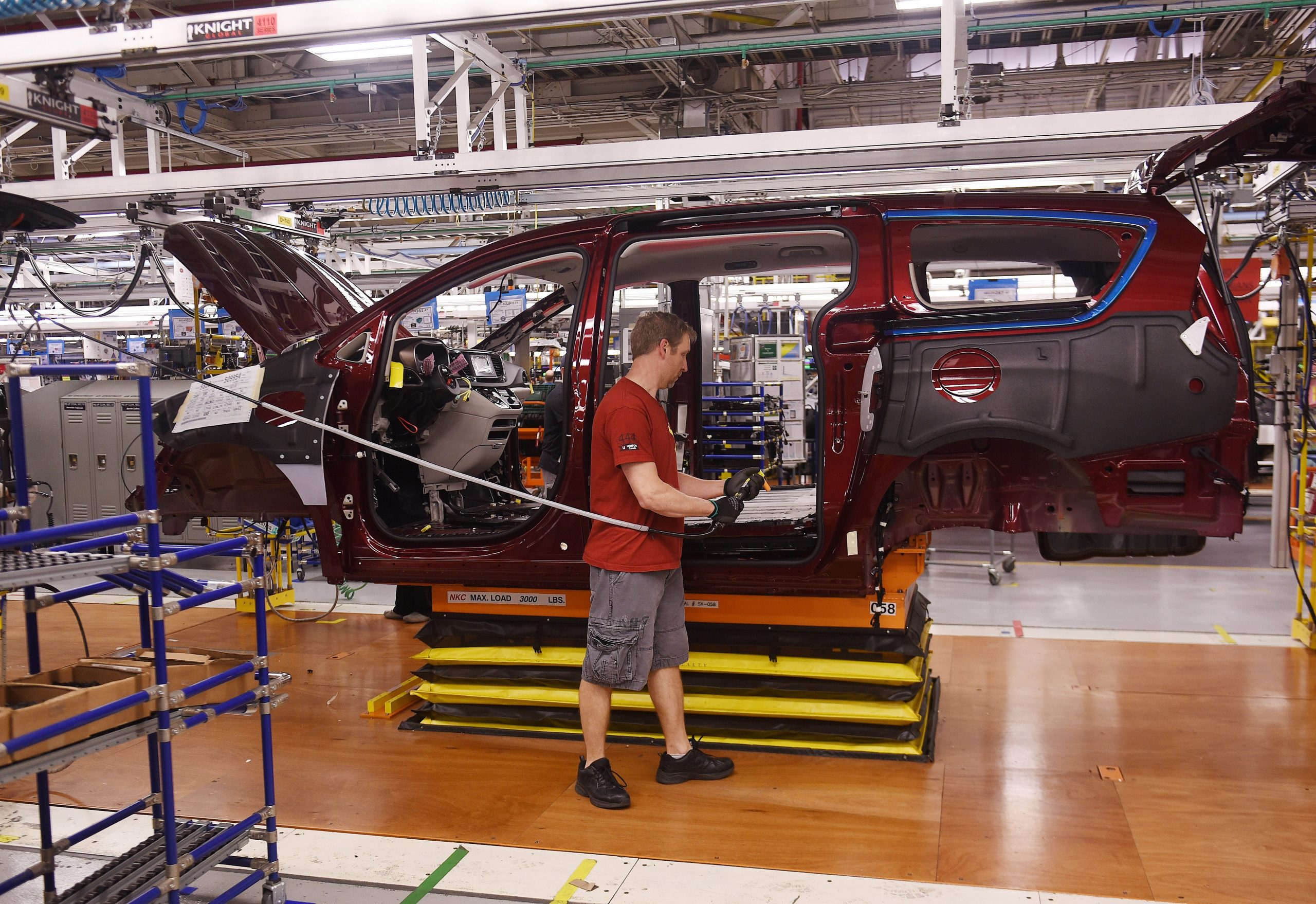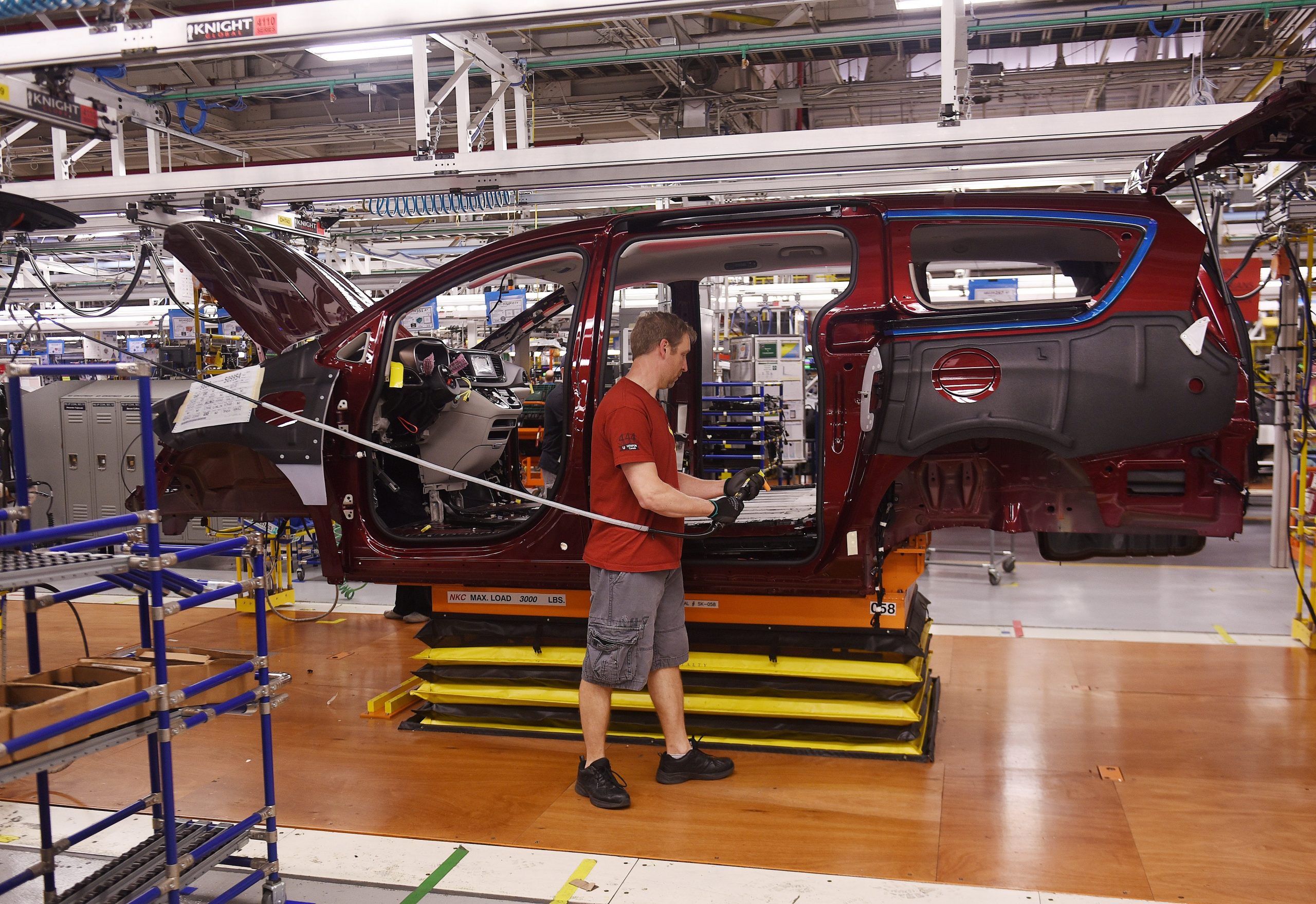Fiat Chrysler Automobiles will idle production at its Belvidere assembly plant, according to Automotive News. The factory, located near Chicago, Illinois, builds the Jeep Cherokee, which saw sales fall drastically in 2019. The news comes as Automotive News Canada reports that FCA will extend the shutdown of its Ontario, Canada factory by a week. FCA’s… Continue reading FCA To Idle Jeep Cherokee Plant For 2 Weeks Due To Poor Demand – Motor1
Tag: FCA
Fiat Chrysler Will Basically Fund Tesla’s Gigafactory 4
Invest
Electric Cars
Electric Car Benefits
Electric Car Sales
Solar Energy Rocks
RSS
Advertise
Privacy Policy
Cars
Published on January 10th, 2020 |
by Johnna Crider
Fiat Chrysler Will Basically Fund Tesla’s Gigafactory 4
Twitter
LinkedIn
Facebook
January 10th, 2020 by Johnna Crider
In a sense, Fiat Chrysler Automobiles (FCA) will be funding Tesla’s Gigafactory 4 (GF4). This insight comes from Automotive News Europe. FCA could spend around $2 billion all the way through 2023 riding Tesla’s zero-emissions coattails.
FCA made a deal, which we reported back in April 2019, to pool its fleet with Tesla’s in order to comply with Europe’s stricter emissions rules. According to a U.S. investment bank, this is funding Tesla’s upcoming German factory. That $2 billion can be split into about $150–200 million per quarter and will give Tesla’s profit margins a nice cushion for 2020.
In 2019, FCA’s CEO, Mike Manly, said that FCA will not have to pay fines for not complying with the tougher European CO2 regulations in 2019 and 2020. The reason is because of the credit deal with Tesla, along with FCA’s forthcoming plug-in hybrid versions of the Jeep Compass, Renegade, and Wrangler. There is also a new fully electric Fiat 500 coming. (The Fiat 500e has been sold in California for years. We reviewed it in 2016 and 2017.)
Some may think that more EVs and hybrids out there are bad for Tesla, but in reality, this is Tesla’s overall goal — to accelerate the transition to electric vehicles and clean energy. Elon Musk once noted that Tesla’s true competition isn’t the EVs coming onto the market, but the gas vehicles that are still being produced.
I believe that 2020 will be the decade of the EV, and this is all thanks to the push from Tesla and Elon Musk (and perhaps partly the mainstream media, which keeps putting Tesla in the news — whether good or bad). The more people focus on something, the larger that something becomes. With more people talking about Tesla, the more people buy a Tesla, and the more the costs come down (as we’ve seen with the Cybertruck).
It’s good to see FCA contributing to the cause, as Kim Paquette said in her tweet. They will end up contributing one way or another, and thus help Tesla achieve its mission, a great way to help lower the amount of CO2 in the air.
Follow CleanTechnica on Google News.
It will make you happy & help you live in peace for the rest of your life.
About the Author
Johnna Crider Johnna Crider is a Baton Rouge artist, gem and mineral collector, and Tesla shareholder who believes in Elon Musk and Tesla. Elon Musk advised her in 2018 to “Believe in Good.”
Tesla is one of many good things to believe in. You can find Johnna on Twitter
Back to Top ↑
Advertisement
Support CleanTechnica – $3/Month
Advertise with CleanTechnica to get your company in front of millions of monthly readers.
Top News On CleanTechnica
Advertisement
Cleantech Press Releases
20 Utah Communities Committed To 100% Renewable Energy In 2019
15 New Electric Articulated Buses Deployed In NYC — 500 Planned To Serve All 5 Boroughs
The Volkswagen ID.3’s Battery
Our New Electric Car Driver Report
Read our new report on electric car drivers, what they desire, and what they require.
CleanTechnica Clothing & Cups
Listen to CleanTech TalkTesla News
30 Electric Car Benefits
Our Electric Vehicle Reviews
EV Charging Guidelines for Cities
Read & share our free report on “EV charging guidelines for cities.”
Advertisement
Follow CleanTechnica Follow @cleantechnica
© 2020 CleanTechnica
Invest
Electric Cars
Electric Car Benefits
Electric Car Sales
Solar Energy Rocks
RSS
Advertise
Privacy Policy
This site uses cookies: Find out more.Okay, thanks
FCA approves Opteven acquisition of WMS Group
The FCA has given its approval to Opteven’s acquisition of The WMS Group. The deal was officially signed on 8 January. Opteven already has an operational presence in UK, managing the approved used warranty programme on behalf of Volkswagen Financial Services UK. The group has ambitions to continue to grow their presence throughout Europe. WMS… Continue reading FCA approves Opteven acquisition of WMS Group
Exclusive: Mate Rimac on his plans to hit the electric car big time
The vital organs behind many of the established automotive order’s next-generation cars aren’t being developed in-house. Instead, a number of industry giants are turning to a relatively modest Croatian company fronted by an enthusiastic inventor-cum-entrepreneur barely in his 30s. Rimac Automobili – known to some as a low-volume electric supercar maker – is looking to… Continue reading Exclusive: Mate Rimac on his plans to hit the electric car big time
Fiat Will Effectively Fund Tesla’s German Factory, Baird Says
Fiat Chrysler Automobiles NV’s deal to pool its fleet with Tesla Inc. to comply with stricter emissions rules in Europe is in effect funding the electric-car maker’s upcoming Germany factory, according to Robert W. Baird & Co.
WMS Group acquisition completed by Opteven
Opteven’s acquisition of WMS Group has been formally completed after gaining approval from The Financial Conduct Authority (FCA). Europe’s second-largest Mechanical Breakdown Insurer (MBI), based in Lyon, France, completed its move to acquire the business-to-business car warranties provider on January 8. John Colinswood will remain as WMS Group as managing director and Martin Quail will… Continue reading WMS Group acquisition completed by Opteven
Waymo secures bigger award against workers who went to rival Uber
SAN FRANCISCO (Reuters) – Alphabet Inc’s Waymo said on Thursday that arbitrators had finalized a judgment of $128 million, plus undisclosed legal costs and interest, against two former employees who went to rival Uber Technologies Inc. FILE PHOTO: A Waymo Chrysler Pacifica Hybrid self-driving vehicle is parked and displayed during a demonstration in Chandler, Arizona,… Continue reading Waymo secures bigger award against workers who went to rival Uber
Fiat Chrysler plants in Windsor and Belvidere will idle for two weeks amid slow sales – The Detroit News
Fiat Chrysler Automobiles NV’s assembly plants in Windsor and Belvidere, Illinois, will idle for two weeks this month following a year of declining sales for the minivans and SUVs built in those plants. Windsor Assembly, which produces Chrysler Pacifica and Dodge Grand Caravan minivans, will be down for the weeks of Jan. 13 and Jan. 20, the… Continue reading Fiat Chrysler plants in Windsor and Belvidere will idle for two weeks amid slow sales – The Detroit News
Fiat Chrysler plants in Windsor and Belvidere will idle for two weeks amid slow sales
Fiat Chrysler Automobiles NV’s assembly plants in Windsor and Belvidere, Illinois, will idle for two weeks this month following a year of declining sales for the minivans and SUVs built in those plants. Windsor Assembly, which produces Chrysler Pacifica and Dodge Grand Caravan minivans, will be down for the weeks of Jan. 13 and Jan. 20, the… Continue reading Fiat Chrysler plants in Windsor and Belvidere will idle for two weeks amid slow sales
Waymo reaches 20 million test miles
Industry leader Waymo has reached the 20 millionth milestone. Waymo tests it Autonomous driving for years and has now set a new record. The industry leader has now driven 20 million test miles autonomously on public roads. Waymo Truck and Chrysler Pacifica Testing autonomous vehicles on the public road remains a form of verification that… Continue reading Waymo reaches 20 million test miles



